Stormont talks: Draft deal to break deadlock published
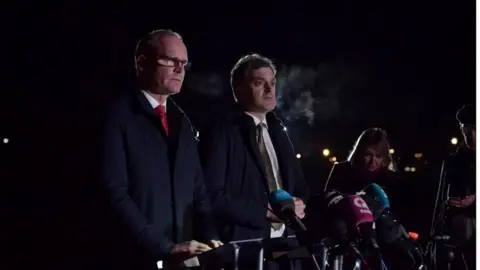 Getty Images
Getty ImagesThe British and Irish governments have published the text of a draft deal aimed at restoring power sharing in Northern Ireland.
Secretary of State Julian Smith and Tánaiste (Irish Deputy Prime Minister) Simon Coveney made the announcement at a press conference at Stormont on Thursday evening.
The move came three years to the day since devolution collapsed in Northern Ireland.
If agreed, the deal, entitled New Decade, New Approach, will see the assembly reconvene on Friday.
Mr Smith, who has written to the assembly speaker asking him to convene a sitting on Friday, said the deal will transform public services and restore public confidence in devolved government.
He asked all parties to support it, saying: "Now is decision time, there is something in this deal for everyone."
The secretary of state said accepting the deal would also bring about the parties' commitment to immediately ending ongoing industrial action by healthcare staff.
It includes pay parity, a new action plan on waiting times and delivering reforms on health and social care.
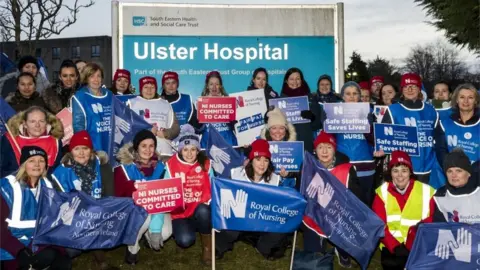 PA
PASimon Coveney said the path that led to this point had taken longer than many people thought.
He said it was "based on the extensive discussions and collective work undertaken by the parties since May last year, following the awful murder of Lyra McKee".
Ms McKee was murdered by the New IRA in April last year. The journalist was shot in the head while observing riots in Londonderry.
"The British and Irish governments, as well as all the party leaders, were left in no doubt by the wave of applause and the very public demonstration in St Anne's Cathedral that we had been called out to get politics in Northern Ireland working again," he said.
He added: "I want you all to hear the words of Lyra McKee herself, the words she wrote in a book and never lived to publish. She said 'Northern Ireland is a beautiful tragedy strangled by the chains of its past, it's a place full of darkness and mysteries, but it's also my home.'"
Mr Coveney urged politicians to "step up and fully represent their citizens", adding: "Forget win or lose... this is a deal full of compromises."
"There is no need, and no public patience, for more process and more discussions. It is time for political leadership and a collective commitment to making politics work for people," he said.

Analysis by BBC News NI Economics Editor John Campbell
If the deal is done, the UK government is promising a large cash injection to tackle acute funding problems in Northern Ireland's hospitals and schools.
The financial annex in the draft deal does not mention any specific figures.
But last year, the most senior official in the Department of Health said he would need somewhere between £700m and £1bn to tackle waiting lists, which are the worst in the UK.
So health service managers will have an expectation that a sum of a least that size will be on the way.

What's in the draft deal?
Two key sticking points in the Stormont talks were around an Irish Language Act and the petition of concern.
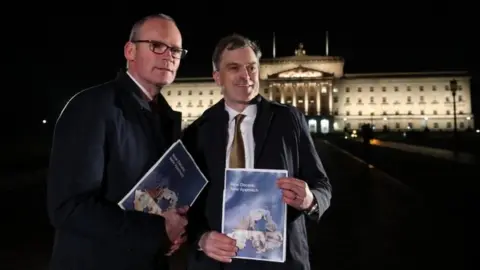 PA
PAThe draft deal says there is to be "meaningful reform" of the petition, which would be "reduced and returned to its intended purpose" and would "only be used in the most exceptional circumstances and as a last resort, having used every other mechanism".
The proposed deal would also see legislation created for the appointment of both an Irish language commissioner and an Ulster Scots commissioner.
It also makes provision for a number of long-standing demands of environmentalists, including the idea that a new Programme for Government would see a separate climate change act for Northern Ireland - the only part of the UK without such legislation.
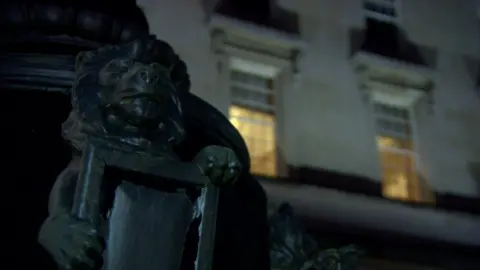
Up until now, Northern Ireland has been bound by and fed into targets set by wider UK legislation.
It proposes an independent environmental protection agency to hold government to account and to ensure compliance with environmental targets.
And there is a suggestion that the ill-fated RHI scheme, which helped collapse Stormont, would be shut down and replaced with different incentives to decarbonise heat.
Other commitments include:
- Setting out a new action plan on waiting times
- Creating 900 new nursing and midwifery undergraduate places
- Police numbers increased to 7,500
- New transparency measures for ministers
- New rules for special advisers
- Office of Identity and Cultural Expression set up
How have the parties reacted?
In a statement released after the press conference, DUP leader Arlene Foster said: "On balance, we believe there is a basis upon which the Assembly and Executive can be re-established in a fair and balanced way."
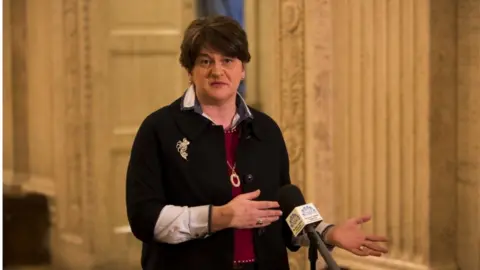 PA
PAThe statement added: "This is not a perfect deal and there are elements within it which we recognise are the product of long negotiations and represent compromise outcomes. There will always need to be give and take."
Sinn Féin president Mary Lou McDonald TD said her party was "studying the text and will give it careful consideration".
"The Sinn Féin Ard Chomhairle will meet tomorrow to fully assess it," she added.
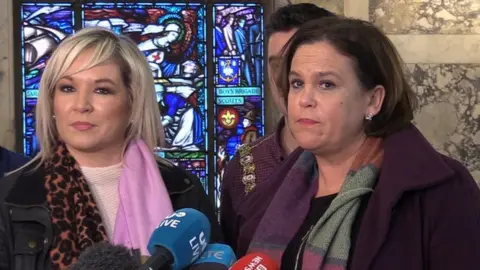 Michael McHugh
Michael McHughThe Ulster Unionists said they would attend the sitting and consider the business put before them if the assembly is recalled on Friday.
Its leader, Steve Aiken, said: "We will consider this complex and far reaching document carefully and consult widely within our party before making any further comments."
